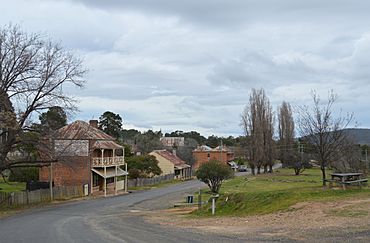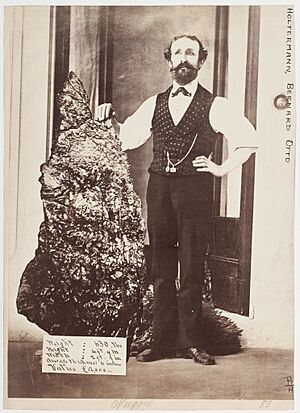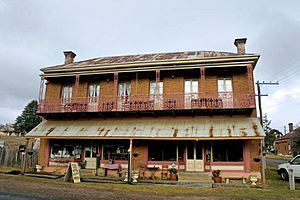Hill End, New South Wales facts for kids
Quick facts for kids Hill EndNew South Wales |
|
|---|---|

Hill End, 2014
|
|
| Population | 102 (2016 census) |
| Postcode(s) | 2850 |
| Location | |
| LGA(s) | Bathurst Regional Council |
Hill End is an old gold mining town in New South Wales, Australia. It's found in the Bathurst Regional Council area. This town became famous during the gold rush days. Today, it's a special place that shows what life was like back then.
Contents
Discovering Gold: Hill End's Past
What we call Hill End today was once part of an area known as Tambaroora. The town of Tambaroora was a few kilometers north of where Hill End is now. In the 1850s, the Hill End area was called Bald Hills. In 1860, a new village was officially named Forbes. Then, in 1862, its name changed to Hill End.
At first, Tambaroora was the bigger town. In 1865, it had seven pubs, while Hill End only had two. But everything changed when a lot of gold was found at Hawkins Hill in Hill End. This happened in the early 1870s. After this big discovery, Hill End quickly became the most important town in the area.
The Gold Rush Boom
Hill End exists because of the New South Wales gold rush in the 1850s. At its busiest, in the early 1870s, about 8,000 people lived there. The town had two newspapers, five banks, eight churches, and twenty-eight pubs! It was a very lively place.
But when the gold started to run out, the town quickly became much smaller. By 1945, only 700 people lived there. In 2006, the population was 166, and by 2017, it was just 80 people. A photographer named Beaufoy Merlin took many pictures of daily life in Hill End when it was booming. You can see his photos in the town's museum.
Connecting the Town: Telegraph and Telephone
In October 1862, the telegraph line reached Hill End from Bathurst. This meant the town could send and receive messages instantly. Before this, it took 12 hours for mail to reach Bathurst by stagecoach.
Later, in 1914, a telephone line was put in. After 60 years of only using telegraph messages, Hill End could now talk to nearby towns and even Sydney. In 1923, a telephone exchange was set up at the Hill End Post Office. This allowed homes and businesses to have their own phones and make calls.
Hill End: A Place for Artists
In the late 1940s, artists like Russell Drysdale and Donald Friend discovered Hill End. Drysdale even painted his famous work, The cricketers, there. The town quickly became a popular spot for artists. Other artists, including Jean Bellette, also worked there. Today, there's a special program that lets artists live and work in Hill End. This helps keep the town's artistic connection alive.
Special Historic Places
Hill End has several places that are important for their history. These are called heritage-listed sites. They include:
- Hill End Historic Site: This is the main historic area of the town.
- Golden Gully: This area includes Golden Gully and Archway.
- 10 km North: This site has the Quartz Roasting Pits Complex.
Exploring Hill End Today
Today, the National Parks and Wildlife Service (NPWS) looks after Hill End as a historic site. Even though it's a historic site, a few people still live there. They run the local pub, a general store, a cake shop, and an antique store.
The NPWS has a museum near the main road. It shows many old photos and tools from the gold rush days. There's also a bigger, private museum called History Hill a few kilometers from town. The NPWS has put up signs around Hill End. These signs help visitors imagine what used to stand on the empty plots of land. Only a few buildings from the gold rush era are still standing. Many of them are still used for their original purpose.
You can visit lookouts by driving on gravel roads. There's also a walking track in town that leads to an old mine and other ruins.
Gold Panning Fun
One of the most popular things to do in Hill End is gold panning. Some older residents even offer tours to teach you how to pan for gold. They take you to the same areas where gold was first found!
It's important to know that you cannot use metal detectors or pan for gold inside the main historic site. However, there is a special fossicking area just past the cemetery, off the Mudgee Road, where you can try your luck.
If you want to stay overnight, the Royal Hotel and local "bed and breakfasts" offer places to sleep. There are also several camping spots within the town limits.
The Bridle Track
The Bridle Track is a road that goes from Duramana (north of Bathurst) straight to Hill End. It's usually an easy track for 4WD vehicles. The track starts as a narrow paved road, but then it turns into a dirt road. About the last 20 kilometers (12 miles) are only wide enough for one car at a time.
How to Get to Hill End
You can reach Hill End from a few different towns:
- From Sofala, New South Wales: It's about 38 kilometers (24 miles) away.
- From Mudgee: It's about 75 kilometers (47 miles) away, and you'll pass through Hargraves.
- From Bathurst, New South Wales: If you go via Turondale, it's about 75 kilometers (47 miles) away.
Camping Options
The National Parks and Wildlife Service offers several places to camp in and around Hill End.
Famous People from Hill End
- Selina Sarah Elizabeth Anderson (1878–1964): She was a person who ran for election in parliament.
- Colin Simpson (1908-1983): This Australian journalist and author spent most of his childhood in Hill End. His aunt and uncle ran the Royal Hotel there.
 | Calvin Brent |
 | Walter T. Bailey |
 | Martha Cassell Thompson |
 | Alberta Jeannette Cassell |






